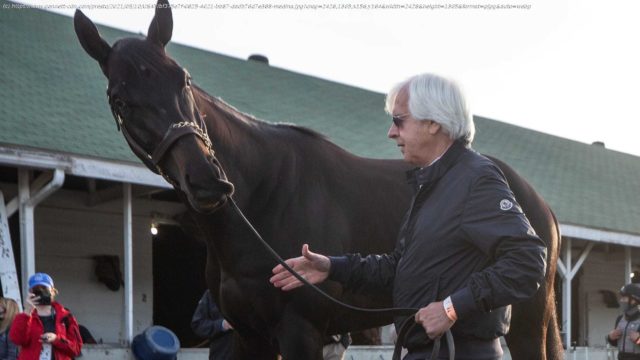In a functional, competently run sport, there would not be a Monday morning in which the legitimacy of its showcase event was up in the …
In a functional, competently run sport, there would not be a Monday morning in which the legitimacy of its showcase event was up in the air more than a week later. There would not be drawn-out, litigious uncertainty about whether a competitor in the middle of a doping inquiry would be allowed to enter the next big race. And there would not be a cartoonish figure in the middle of the scandal going on cable news to blather about “cancel culture” without being accompanied by a laugh track. And yet, within the Potemkin village that is horse racing governance in the United States, this was a very real sequence of events that spun off from Sunday’s bombshell that Medina Spirit had tested positive for a small but illegal amount of the anti-inflammatory drug betamethasone coming out of the Kentucky Derby, putting the colt’s win in jeopardy and an already beaten-down sport on the precipice of becoming a punchline. In horse racing’s zeal to plumb the depths of its own brokenness, there are no winners, only losers. It’s already a long and growing list. There’s the Maryland Jockey Club, which threatened in a statement to deny Medina Spirit entry into the Preakness but moved its draw for this weekend’s Preakness from Monday to Tuesday, hoping for perhaps some clarity on whether a split sample would confirm the test result. Ultimately, nobody in horse racing thinks Maryland racing officials truly have the spine to keep Medina Spirit out of the race, either due to legal threats or, from a more cynical view, the potential ratings and wagering bonanza of having the antihero of the moment in the race. There’s horse racing’s antiquated system of drug testing itself, where different states have different rules, positive tests are supposed to be kept quiet until a long appeal process plays out, and there’s little quality control in the testing process itself or the labs used to analyze the samples. And then there’s trainer Bob Baffert, who has responded to the revelation that his seventh Kentucky Derby win might be stripped away by going on a poorly thought-out media offensive in which he has maintained his innocence and doubled down on the notion that a “knee-jerk, cancel culture kind of reaction” has robbed him of due process, as he said on Dan Patrick’s radio show. (If accountability for doping in sports is part of cancel culture, the phrase has indeed lost what little substance it had to begin with.
Домой
United States
USA — Sport Opinion: Medina Spirit saga is exposing horse racing's incompetence on doping






